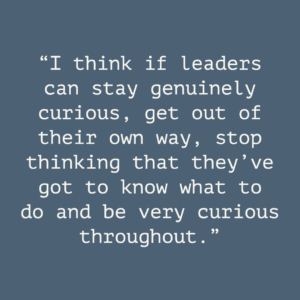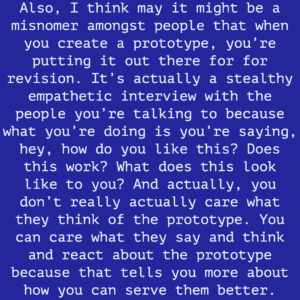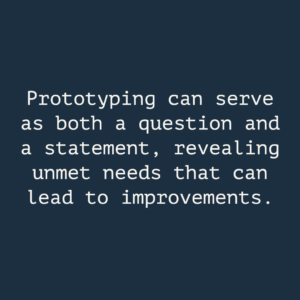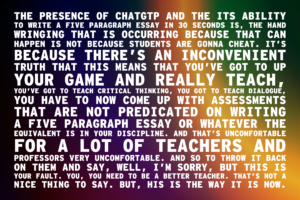177: Bridging Design Thinking and AI: A Conversation with John Nash
Manage episode 373060885 series 3014939
CHALLENGES & GOALS:
In this episode John shares insights on how design thinking can help leaders create positive change within their organizations and foster a sense of belonging among staff and students. Additionally, the integration of AI tools like ChatGPT into education and potential ethical concerns are discussed.
Key Points
Design thinking promotes empathy work and need-finding among leaders.
Human-centered design can contribute significantly to improving student experiences during lectures.
Design thinking can be applied not only in classrooms but also in leadership programs.
Schools may benefit from having two types of leaders: those who excel at management tasks and those who are more visionary or inspirational.
AI tools like ChatGPT can enhance learning experiences but also pose challenges in maintaining academic integrity and trust between students and teachers.
Gaps
Many educational leadership programs do not provide enough tools for leaders to effectively involve their community and tap into collective wisdom.
Here are some suggestions and resources that may be helpful for your next lecture:
Introduce practical examples or case studies where design thinking has been successfully implemented in educational settings.
Provide resources on how to integrate AI tools ethically into education without compromising academic integrity.
Student Feedback and Questions
"How can we ensure that AI tools like ChatGPT don't lead to cheating or plagiarism?"
Suggestion: Focus on alternative assessment methods that cannot be easily manipulated by AI tools.
Suggestion: Use AI to improve critical thinking skills instead of relying solely on content generation.
Critical Takeaways:
Design thinking can help leaders leverage the wisdom of their community.
Leaders who practice design thinking develop open-mindedness, radical collaboration, and a focus on showing rather than telling.
Prototyping can serve as both a question and a statement, revealing unmet needs that can lead to improvements.
Students are using ChatGPT more than educators realize.
Large language models can be programmed in plain English to teach various skills.
Emerging Patterns:
The importance of empathy in leadership
The need for diverse perspectives in decision-making processes
Balancing management skills with inspirational leadership
Ethical concerns about data usage by large language models
Redefining academic integrity in the age of AI
Key Moments:
"We tend to have them go out and become enamored with the idea that they've got to figure everything out on their own."
"The smartest person in the room is the room."
"If you're human-centered, you're keeping the people that are most affected by what you do as close to you as possible as partners in your work."
"I think if leaders can stay genuinely curious, get out of their own way, stop thinking that they've got to know what to do and be very curious throughout."
"It's really interesting what happens when you start to say, I'm gonna open up my ears and eyes and let me hear what people need and want."
"I'm a student. You have no idea how much we're using ChatGPT."
"I taught the robot to teach the humans to be human-centered."
"This is all on them (teachers), all of it is on them."
"You've got to up your game and really teach, you've got to teach critical thinking, you got to teach dialogue."
"We haven't thought enough about how ChatGPT and large language models are computer programs that can be programmed in plain English to teach us stuff."
RESOURCES & FURTHER LEARNING:
- Book: Design Thinking in Schools: A Leaders’ Guide to Collaborating for Improvement
- dLab: http://dLab.uky.edu
- Podcast: Online Learning in the Second Half
- John on LinkedIn
- Opinion | I'm a Student. You Have No Idea How Much We're Using ChatGPT.
FAVORITE MOMENTS FROM THE CONVERSATION:






216 episoade




